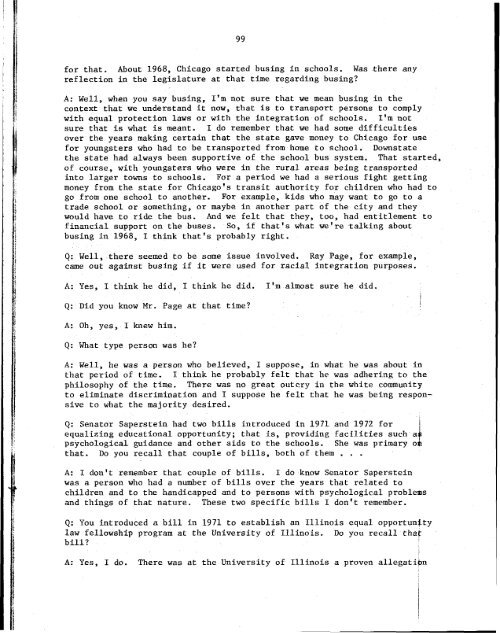Cecil A. Partee Memoir - University of Illinois Springfield
Cecil A. Partee Memoir - University of Illinois Springfield
Cecil A. Partee Memoir - University of Illinois Springfield
You also want an ePaper? Increase the reach of your titles
YUMPU automatically turns print PDFs into web optimized ePapers that Google loves.
for that. About 1968, Chicago started busing in schools. Was there any<br />
reflection in the legislature at that time regarding busing?<br />
A: Well, when you say busing, I'm not sure that we mean busing in the<br />
context that we understand it now, that is to transport persons to comply<br />
with equal protection laws or with the integration <strong>of</strong> schaols. I'm not<br />
sure that is what is meant. I do remember that we had some difficulties<br />
over the years making certain that the state gave money to Chicago for use<br />
for youngsters who had to be transported from home to school. Downstate<br />
the state had always been supportive <strong>of</strong> the school bus system, That started,<br />
<strong>of</strong> course, with youngsters who were in the rural areas being transported<br />
into larger towns to schools. For a period we had a serious fight getting<br />
money from the state for Chicago's transit authority for children who had to<br />
go from one school to another. For example, kids who may want to go to a<br />
trade school or something, or maybe in another part <strong>of</strong> the city and they<br />
would have to ride the bus, And we felt that they, too, had entitlement to<br />
financial support on the buses. So, if that's what we're talking about<br />
busing in 1968, I think that's probably right.<br />
Q: Well, there seemed to be some issue involved, Ray Page, for example,<br />
came out against busing if it were used for racial integration purposes.<br />
A: Yes, 1 think he did, I think he did. I'm almost sure he did.<br />
Q: Did you know Mr. Page at that time?<br />
i<br />
1<br />
A: Oh, yes, I knew him.<br />
Q: What type person was he?<br />
A: Well, he was a person who believed, I suppose, in what he was about in<br />
that period <strong>of</strong> time, I think he probably felt that he was adhering to the<br />
philosophy <strong>of</strong> the time. There was na great outcry in the white community<br />
to eliminate discrimination and I suppose he felt that he was being responsive<br />
to what the majority desired.<br />
Q: Senator Saperstein had two bills introduced in 1971 and 1972 for<br />
equalizing educational opportunity; that is, providing facilities such a<br />
psychological guidance and other aids to the schools. She was primary o<br />
that. Do you recall that couple <strong>of</strong> bills, both <strong>of</strong> them . , .<br />
I<br />
A: I don't remember that couple <strong>of</strong> bills. I do know Senator Saperstein<br />
was a person who had a number <strong>of</strong> bills over the years that related to<br />
children and ta the handicapped and to persons with psychological problems<br />
and things <strong>of</strong> that nature. These two specific bills I don't remember.<br />
Q: Yau introduced a bill in 1971 to establish an <strong>Illinois</strong> equal opportunfty<br />
law fellowship program at the <strong>University</strong> <strong>of</strong> <strong>Illinois</strong>. Do you recall thap<br />
bill?<br />
I<br />
A: Yes, 1 do. There was at the <strong>University</strong> <strong>of</strong> <strong>Illinois</strong> a proven allegatibn
















